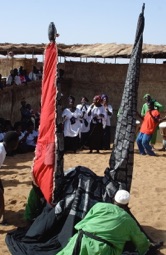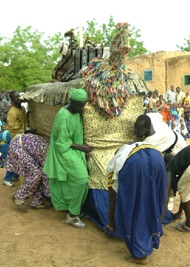cd: bozo songs of Kirango



By Elisabeth den Otter
The inhabitants of Kirango, a village situated on the bank of the Niger river at 35 km
from the city of Ségou, belong to the Bamanan (farmers) and Bozo (fishermen) ethnic
groups. This CD contains songs of the Bozo: at the occasion of marriage or circumcision,
to accompany the 'sogolon' dance, and to accompany masks and puppets during the
masquerade.
The songs are sung -in Bamanan language- in pairs; the first one is slow,
the second one faster. Most of the songs accompany the 'sogow' (animals),
large puppets representing animals, often aquatic.
Marriage songs:
3) 'Don bèè tè kuma ye' (One cannot complain)
-
4)'Nyèni laminè' (You have to accept suffering)
Marriage is a difficult time for a young woman: she has to leave her family-of-birth
to live with her family-in-law, and is not always treated well. The songs advise them
to behave well, not to complain, and to accept the suffering.
♫ click here to listen to a fragment of 'Don bèè tè kuma ye'
A ka laminè, de
Don bèè tè kuma ye
U ka kè i la, u ka fò i la
I ka laminè, Malimusow
Don bèè tè kuma ye
(You have to accept!
One cannot complain
Whatever they do or say
You have to accept, woman of Mali
One cannot complain)
Circumcision songs:
17) 'N'ba ye kàlifa' (My mother has consigned me)
-
18)'Baduga' (My mother's blessing)
The mothers and the village chiefs give their blessing to the recently
circumcised boys; the children of the brave men know no fear.
♫ click here to listen to a fragment of 'Baduga'
Baduga an dugu nyèmaa
Dugu nyèmaaw bèè ka duga
Cèfarin denw tè siran
(A mother's blessing to our village chiefs
All the village chiefs will give their blessing
The children of the brave are not afraid)
Songs to accompany the 'sogolon' dance:
7) 'Sogow ye min' (The animals have drunk!)
-
8)'Sòsonin' (Little mosquito)
Songs to accompany the puppets:
-The bird (Kònò)
1) 'Kirina kònò' (The bird from Kirina)
-
2)'I juguw na sa' (Your ennemies will die)
Rivalry is a recurrent theme in the songs: people will be against you,
wherever you go, whatever you do or say, but they will be dead one day.
♫ click here to listen to a fragment of 'I juguw na sa'
I juguw na sa de, Babèlè Dembele
I juguw tè balo
I taara kòrònna, Babèlè taara tilebin
Nin bèè b'i juguya
(Your ennemies will die, Babèlè Dembele
Your ennemies will not live
Wherever you go (north or west)
Your ennemies will do you wrong)
-The scorpions (Bunteninw)
5) 'Kama jo' (Kama is right)
-
6)'Duga màsa kòrò' (The old king vulture)
-The antelope (Koon)
9) 'Sogowdennin kelen' (The little animal)
10) 'Yèlènla san gunka' (They have climbed on the island)
-The snake (Sa)
11) 'Sa yo mininya yo' (The python)
12) 'Jujuju'
-The manatee (Ma)
13) 'Dimi sènsèn' (Drag the fishing net gently)
14) 'Cèlu man kan' (People are not equal)
-The hippopotamus (Mari)
-
15)'Mariw' (The hippopotamuses)
-
16)'A ye minèni kè kininbolo' (He has taken with his right hand)
This song celebrates the hunting skills of the Bozo; Namama and Kalajo
are hunting dogs.
♫ click here to listen to a fragment of 'A ye minèni kè kininbolo'
A ye minèni kè kininbolo
Ka minèni kè numanbolo
A ye fàalikè kininbolo
Ka minè ni kè numanbolo
Namama y'a kan kari, Kalajo y'a kan kari
(He has taken with his right hand
He has taken with his left hand
He has killed with his right hand
He has taken with his left hand
Namama/Kalajo has broken his neck)
-The fish (Wulujege et Saalen)
19) 'I ni baara' (I greet you)
-
20)'Dugare' (The mirror)
The dog-fish and the captain-fish are big predatory fish, appreciated for their
good taste. They are compared -very poetically- to a golden mirror, when they
jump up from the water or are caught in a fishing net.
♫ click here to listen to a fragment of 'Dugare'
Ya ya ya, dugare
Ya ya ya, sanundugare
Wulujègè kera dugare
Ya ya ya, sanundugare
(Ya ya ya, mirror
Ya ya ya, golden mirror
Wulujege has become a mirror
Ya ya ya, a mirror of gold)
Musicians: Fatumata Famanta (singer) and a women's choir;
Moulaye Tamboura, Lasseni Jire, Moulaye Niono and Moussa Sampana
(players of 'bongolo' and 'nganga' drums).
With thanks to the people of the Jaka quarter of Kirango, and to
Moussa Diakité (translation of the songs into French)
Duration: 50 minutes
N.B.: The liner notes of the CD are in French.
Recordings, texts, photos and production: Elisabeth den Otter
Samaké Records 05, 2008 ©
➤email: edomusic@mac.com
Zzrit la facillum init lut dol oret ullame tuero odet lor adit, com modet tatummy niam dolort onu llaore te dolor in estrud et dunt iure te feugiam velit praese exer aute mcommodit dolorer.


